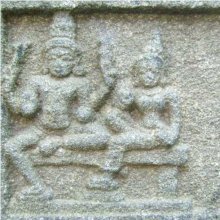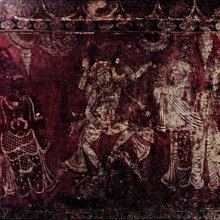Karaikkal Ammaiyar, Kāraikkāl Ammaiyār: 2 definitions
Introduction:
Karaikkal Ammaiyar means something in Hinduism, Sanskrit, Tamil. If you want to know the exact meaning, history, etymology or English translation of this term then check out the descriptions on this page. Add your comment or reference to a book if you want to contribute to this summary article.
Images (photo gallery)
In Hinduism
General definition (in Hinduism)
Source: Oxford Bibliographies: HinduismKāraikkāl Ammaiyār, the “Mother/Woman from Kāraikkāl” in the southeastern Indian state of Tamilnadu, was probably the first poet to write hymns to the god Shiva in the Tamil language, in approximately the mid-6th century. Speaking to god in one’s mother tongue, rather than Sanskrit, was pivotal to the development of Hindu bhakti or devotionalism that arose in response to the religions of Jainism and Buddhism, which reached the apex of their popularity in South India during the 5th and 6th centuries. She is considered the author of 143 poems organized into four works of poetry that are included in the eleventh book of the Tirumuṟai, the Śaiva canon: Aṟputat Tiruvantāti (Sacred Linked Verses of Wonder), with 101 veṇpā verses; Tiruviraṭṭai Maṇimālai (The Sacred Garland of Double Gems), with 20 stanzas alternating in veṇpā and kaṭṭalaik kalittuṟai; and the two patikams called Tiruvālaṅkāṭṭu Mūtta Tiruppatikaṅkaḷ (First Sacred Verses on Tiruvālaṅkāṭu), which are ten-verse poems with an eleventh “signature” verse each and which are set to music (some texts call the first patikam Tiruvālaṅkāṭṭu Mūtta Tiruppatikaṅkaḷ and the second patikam simply Tiruvālaṅkāṭṭu Tiruppatikaṅkaḷ, or Sacred Verses on Tiruvālaṅkāṭu).
Kāraikkāl Ammaiyār’s poetry reveals a fascinating portrait of the localization of the pan-Indian god Shiva in the Tamil country and the early formation of a self-conscious community of devotees dedicated to him. In several of her verses, Kāraikkāl Ammaiyār identifies herself as a pēy (demon or ghoul), a member of Shiva’s troupe of ghouls that dance with him in the cremation ground. In the state of Tamilnadu, Śaiva Siddhānta developed over many centuries to become the dominant philosophical, theological, and ritual system associated with the god Shiva. The tradition was systematized between the 12th and 14th centuries but draws its devotional perspectives from the stories and hymns of the Nāyaṉārs (leaders), the sixty-three devotees of Shiva who were canonized as saints in Cēkkiḻār’s 12th-century hagiography, the Periya Purāṇam, and who continue to be venerated in the Tamil Śaiva tradition today; Kāraikkāl Ammaiyār is the only female poet among them. In Cēkkiḻār’s narrative, Kāraikkāl Ammaiyār is a beautiful, devoted wife and ardent Shiva devotee whose husband is frightened by the manifestations of Shiva’s grace she has earned and thus abandons her. Ammaiyār then asks Shiva to take away her earthly beauty and give her a demon form in which she can properly worship him.
Languages of India and abroad
Tamil dictionary
Source: DDSA: University of Madras: Tamil LexiconKāraikkālammaiyār (காரைக்காலம்மையார்) [kāraikkāl-ammaiyār] noun < காரைக்கால் [karaikkal] +. Name of a canonized Śaiva saint, authoress of certain works included in the Patiṉorān-tirumuṟai, one of 63; அறுபத்துமூவர் நாயன்மாருள் பெண்பாலரான வரும், பதினொராந்திருமுறையுட் சில பிரபந்தங்களுக்கு ஆசிரியருமான அடியார். (பெரியபுராணம்) [arupathumuvar nayanmarul penpalarana varum, pathinoranthirumuraiyud sila pirapanthangalukku asiriyarumana adiyar. (periyapuranam)]
Tamil is an ancient language of India from the Dravidian family spoken by roughly 250 million people mainly in southern India and Sri Lanka.
See also (Relevant definitions)
Partial matches: Ammaiyar.
Full-text: Muttatiruppatikam, Karaikkarpeyar, Peyar.
Relevant text
Search found 5 books and stories containing Karaikkal Ammaiyar, Kāraikkālammaiyār, Kāraikkāl ammaiyār, Karaikkalammaiyar, Kāraikkāl-ammaiyār, Kaaraikkaalammaiyaar; (plurals include: Karaikkal Ammaiyars, Kāraikkālammaiyārs, Kāraikkāl ammaiyārs, Karaikkalammaiyars, ammaiyārs, Kaaraikkaalammaiyaars). You can also click to the full overview containing English textual excerpts. Below are direct links for the most relevant articles:
The Religion and Philosophy of Tevaram (Thevaram) (by M. A. Dorai Rangaswamy)
Nayanar 24: Karaikkal Ammeiyar (Ammaiyar) < [Volume 4.1.1 - A comparative study of the Shaivite saints the Thiruthondathogai]
Chapter 1 - Rise of the Temple cult in Saivism < [Volume 1 - Nampi Arurar’s Tevaram (his life and age)]
The Pey, Putam and Paritam (different sorts of Ganas, attendants) < [Volume 2 - Nampi Arurar and Mythology]
Pallava period (Social and Cultural History) (by S. Krishnamurthy)
Nayanmars during the Pallava period < [Chapter 3 - Socio-Religious Life]
Status of Women < [Chapter 3 - Socio-Religious Life]
Middle Chola Temples (by S. R. Balasubrahmanyam)
Temples in Tiruppudaimarudil < [Chapter II - Temples of Rajaraja I’s Time]
Temples in Gangaikondan < [Chapter II - Temples of Rajaraja I’s Time]
Temples in Attur < [Chapter II - Temples of Rajaraja I’s Time]
Later Chola Temples (by S. R. Balasubrahmanyam)
Temples in (Ten-) Tiruvalangadu < [Chapter XII - Temples of Kulottunga III’s Time]
Temples in Tiruvalangadu < [Chapter II - Temples of Kulottunga I’s Time]
Ananda Coomaraswamy on the status of Indian woman < [April – June, 1986]

